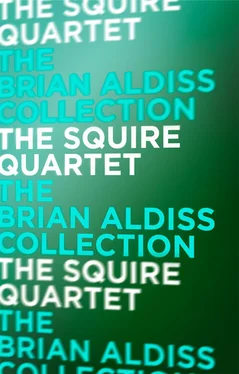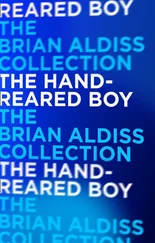‘Is that what you call a grand reconciliation?’
‘I hoped for something better.’ He regarded her narrowly, his expression closed. ‘When two countries are hostile, they make what peace they can. So with us. Do you wish to come back? Are you prepared to make a go of it? It’s now or never.’
‘Don’t start laying down conditions. Maybe it’s too late. My heart isn’t as soft as it once was. Things will never be what they were.’
‘How I wish it was possible to turn the clock back …’
She asked, ‘What is this grand reconciliation you talk about, anyway?’
He attempted lightness. ‘As I say, maybe a housewarming at the Hall, friends round, celebrations, flowers, champagne, Nellie going mad, the girls back in their own beds, you and I in ours, kisses, violins, apologies, forgiveness. You name it.’
She shook her head. ‘I’m sorry, Tom, you’re being unreal. If you think that after what’s happened we can just fling ourselves into each other’s arms, you’re mistaken. It may appeal to your sense of drama but not to mine. I’m not one of your actresses, however much you may regret the fact.’
That evening, Teresa and her mother were waved goodbye as they continued on their way to Norwich. Squire, restless after the fruitless encounter, decided to drive himself over to Pippet Hall. The Society for Popular Aesthetics was expanding rapidly; the secretary was even able to take on a secretary; and Squire needed documents relating to its foundation for an article he was writing. The Hall was only six miles from Blakeney.
He had been staying permanently in London, either with friends or at his club, since the New Year, when the shock of seeing Teresa in the company of Jarvis had discouraged him from returning to Norfolk. London was more convenient, and provided more than enough work for him. So the Hall was closed down, and Matilda Rowlinson and the farm manager looked after it. He had been back only twice – once for a day, once for a solitary weekend – in the last half-year.
The grass on the lawn looked rather long. The downstairs windows of the house were shuttered; that would be careful Matilda’s work. Caught by the peace of the evening and the surroundings, Squire strolled across the side lawn before entering the house, to gaze at butterflies circling round Teresa’s buddleia. Here The Who had once played to delighted crowds, and local rock’n’roll groups like The Bang-Bang. Pop was truly an international language.
Teresa and he had had a language in common in those happier days. But now. Your silence is all I need from you.
He tried not to resent the cruel things she had said that afternoon. She was, in her own way, uttering a cry for help.
His shoes were damp from an early dew as he unlocked the front door and entered the hall. He stood, closing the solid oak behind him. No children called except spectrally. No Dalmatian came up at a run, scattering mats. Only a cat appeared, yawning and stretching, to dissolve into the shadows.
Light filtering through the tall windows on the staircase filled the hall with a dim beauty. He stretched his arms and walked about with pleasure. The portraits of Matthew and Charlotte looked benevolently down. His footsteps echoed.
‘All I need from you is your silence.’
In his study, the darkness was so intense that he opened one of the shutters. Outside lay the meadows where once had nested the pipits who gave their name to the place; now only a few blackbirds hopped amid the grass, mechanically perky.
When he had finished at his desk, and collected the papers he needed, he went over to his refrigerator, which stood on a filing cabinet under Calvert’s painting, and poured himself a vodka-on-the-rocks.
Her anger, her vindictiveness, had seemed so personal. He could not tell how much of it was impersonal – directed at some mysterious target before which he happened to be standing – yet what he hoped was reason told him that she nursed some grievance beyond any folly he had committed.
His behaviour to her was, in a sense, the opposite of hers. He tried always to respond to her as a person, personally. Yet he was aware of the impersonality of his and of all experience. That was where mysticism crept in: he saw how he was not only living but being lived. Well, that was not necessarily a mystical perception so much as a biological one. He was not only an individual but a link in the totally impersonal chain of life, a torch-bearer for the selfish gene.
Which did not by any means absolve the individual from morality. It made the individual important beyond any influences in his own brief lifetime, for by his behaviour for good or ill he helped shape (yes, in a small way) the needful moral improvement of the human race in time to come. Improvement of the whole damned species could only come through the striving of each individual; at that point moralities and biologies met.
He could not seem to explain to Teresa – though he had tried in happier days – that his appreciation of her as an individual was enhanced by his awareness of the impersonal forces in her, that his life experience was most directly read through her being, that it was precisely their sexual and mental closeness that enabled them to explore the richness of being alive. However mistakenly, he had concentrated his life increasingly on that exploration in recent years; both ‘Frankenstein’ and his fatal love affair sprang from it. It was a quest for that richness of experience, an intensification of it before it died from beyond his clutches, which turned him to Laura: and Tess’s subsequent rejection of him that had left him isolated.
The vodka was cool in his throat. He was not acutely unhappy. Isolation was nothing new to him. Perhaps he could soon face the fact that reconciliation was not possible between him and his wife.
In which case – he would have to sell up Pippet Hall.
He closed the shutter and walked from the room, taking the papers he needed with him.
‘All I really want now is your silence.’
Silence had a sinister quality. He equated it with death, and only rarely with spirituality. The silence Teresa demanded from him was death, not spirit. And silence was unique in this respect; it was something one could demand and unfailingly receive. Ultimately, inevitably, he would become silent under her indifference.
If he dreaded silence, there was something he dreaded more: forms of language which masked silence, the absence of feeling. Teresa still felt intensely; he could still hurt her. So there was hope. But all around him he encountered defensive lack of feeling. Official language, the language of the military or of bureaucracy, Marxist jargon – all these were enemies of simple human experience. Instead of conjuring experience, they annihilated it in their repressive structuring.
At least Teresa had spoken to him directly. The worst thing was a woman talking Marxism or one of those other desiccated male languages. One good reason for continuing to love women, even when the going was rough, was that, on the whole, they stayed too human to go for ideological language.
He climbed the stairs, hesitated before their bedroom, and went instead down the passage to the old nursery. He opened the door, half-expecting to find the interior a glowing brown, as he remembered it from childhood, with the warmth of the stained floor and walls enhanced by a coal fire. Instead, he was greeted by Dulux high gloss white paint.
John’s old red wooden fire-engine stood on top of the cupboards. The dolls’ house stood on the table by the window, where he and Adrian had played for long hours with their Meccano.
He gazed blankly out of the window. A rabbit had joined the starlings on the lawn. What would become of the old place if he gave up? Fall into ruin? Wrenched from its purposes and turned into an institution?
Читать дальше












